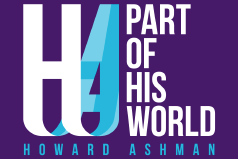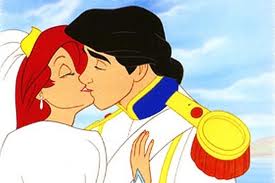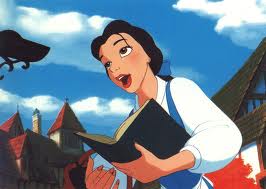John Musker Question Countdown #5
Question #5 How does an idea for a project usually begin? Where does inspiration come from? And how long does it take for an idea to really take off?
No two projects have the same period of gestation. And their sources are usually varied as well. As has been recounted here and elsewhere, Little Mermaid began when Jeffrey Katzenberg and Michael Eisner conducted a Gong Show in January of 1985. Directors and story people were to bring in multiple ideas for possible animated features. In preparation for the meeting, Ron Clements went to a bookstore in North Hollywood, thumbed through a book of fairy tales and read “The Little Mermaid” by Hans Christian Andersen. The setting and characters were very cinematic, so much so that Ron was surprised that it hadn’t been adapted before by Disney. Then he got to the ending
and thought, now I know why (one of Ron’s first acts was to fashion a “happy ending”).
In the early development, Roy Disney was concerned that the ending might be too far from Andersen. Ron has a quote from someone, Bruno Bettelheim maybe, that all true fairy tales have happy endings or something to that effect. I remember Howard talking about the ending. I think he was sensitive to changing Andersen’s ending but said something sarcastic to the effect of, “Yeah right, like we’re gonna do a sad ending. People don’t want that!”
(Speaking of which, I forgot to mention in an earlier post one other thing we got Howard to go along with us on. That was the choral treatment at the end of Mermaid. I asked Howard to make a big choral statement, the “Disney choir” to reprise Part of Your World in the tradition of other Disney fairy tales. Howard was initially skittish about this, either feeling it risked being too big, or too clichéd, or just too corny, but he eventually embraced the idea and went for it. He admitted later he was really happy he got talked into the “classic” finish. I’m happy he did.)
The idea I pitched at the “Gong Show” was to do a “New Wave” fairytale. I wanted to take a Disney fairytale and put a spin on it with “New Wave” pop music and an urban setting. So my story revolved around a Cyndi Lauper-like Cinderella–esque heroine who worked at a fast food joint and dreamed of bigger things. Her fairy godmother was a bag lady. It was not one of the ideas that got “picked up” from that meeting.
Since we’re talking about Howard, though, I will interject here that I remember having a discussion about Cyndi Lauper’s merits versus Madonna. We would have these discussions occasionally over lunch at Chow’s Kosherama, a Burbank establishment that offered deli and Chinese food. (These lunches would be followed by Howard turning to his friend and assistant, Nancy Parent, and saying, “Nan…Mylanta!”)**
Anyhoo, Howard told me that he thought Madonna was a flash in the pan whose talent was more superficial. Cyndi Lauper, on the other hand, was the real deal in Howard’s view, and would last longer because her talent came from a more genuine place. I wonder what Howard would make out of how things have played out. Somehow, I don’t think it would change his feelings about their respective talents.
But what I really wanted to talk about (and it’s a big leap from that question, but what the heck…) is our involvement for 30 seconds in Beauty and the Beast, and our POV from the sidelines as Howard got involved. While we were doing Little Mermaid, Beauty and the Beast was in development. Don Hahn, the film’s producer, had a team in France that included Dick Purdum, a talented British animator who had worked with Richard Williams, among other things. Linda Woolverton was the screenwriter, brought on after earlier scripts hadn’t jelled, I believe. There were artists doing viz dev as well. It was not at that time a musical.
Mermaid was nearly done. It had previewed through the roof. Jeffrey, despite running roughshod over Ron and me during production, was happy. Beauty had a script by Linda that Jeffrey loved. As I recall when they went to board it, Jeffrey’s directive was not to change a word of it. And so it was storyboarded and put up on reels exactly as scripted. Jeffrey saw those reels and again, as I recollect, wasn’t happy at all, despite them obeying his directive. With Mermaid seemingly as his model, Jeffrey wanted to bring some of “that” to Beauty and the Beast, which meant Ron and me. And it also meant Howard and Alan. So as Ron and I were putting the final touches on Mermaid, we found ourselves in Hollywood at Musso and Franks for a lunch with Peter Schneider, Jeffrey’s point man. Peter told us they would like Ron and me to take over as directors of Beauty and the Beast. We were somewhat stunned by the offer. We were exhausted by the stress of making Mermaid. It had been a grueling, stressful process (it was also fun and challenging, of course.) Me being me, I was about to say OK. I am the child of Depression-era parents. If someone offers you a job, you don’t take that lightly
Ron, on the other hand, although roughly the same age, and Midwestern work ethic also in place, had a different response. He felt very strongly that he was burned out and in need of a break. He saw it as getting right back on the merry-go-round with more stress than ever. Ron was newly married at the time as I recall and had even deferred his honeymoon. So he had no qualms about declining. It takes two to tango, though, so I said OK, I’ll decline also even though my instinct was to say yes, and after talking it over a bit later we told Peter we were not going to take him up on his offer.
We were just about to head down to Florida for the press junket for Little Mermaid. They were going to have a big Beauty confab down there with the principal players, including Jeffrey and including Howard, and they told us you have to come as well which we really didn’t want to do for fear of getting “sucked in.”
So we went down there to Walt Disney World for the event. I remember as we got to the park, hearing Under the Sea played by a band as part of a parade. From the back, I saw a pretty girl dancing to the music. Cool! Then she turned around and I saw it was Jodi Benson! I heard later from Howard, when he first heard the music from Mermaid played in the parade down there at that same junket, he had burst into tears. Knowing then that he was HIV Positive, and seeing and hearing his music woven into the fabric of a Disney theme park, he had a sense that the music would last beyond his own life. And so it shall all of ours.
It was exciting, as we had never really done a big press junket of anything like this. Our press junket on Great Mouse Detective was lunch with Joe Gelmis of Newsday in our New York hotel when we were visiting Howard for the first time. That was it. This had reporters from all over the country flown in to talk to us, Howard and Alan, Jeffrey, Roy Disney, Jodi, etc.
At some of the round tables with the press, there were some female reporters who gave Ron and me grief because Ariel married a prince in the end of the film. They gave Jeffrey grief, too, and he said as we did, this was story of a girl with a love for all things human, not just a prince. He told these women journalists adamantly that there was no basis for their complaint. Then when we got alone with Jeffrey as we segued into the meeting on Beauty and the Beast, he said, “Sheesh!! They put me through the ringer! Guys! Whatever we do, I don’t wanna get tagged like that again! We gotta make sure that doesn’t happen on this one!” Thus part of the “enlightened” approach on Belle came not from some deep soul searching from a feminine point of view, but from Jeffrey getting roughed up in Florida (and not wanting any critique that might somehow diminish the box office of the movie.)
So we were told we absolutely had to attend this big meeting on Beauty and we didn’t want to. Ron and I had our own Disney “handler” who, in our brief time not talking to the press, escorted us around the park and got us on rides without waiting in line. I had visions of one of those beautiful girls in the plaid skirts and the red vests. Instead we got James, a dimpled ever-smiling black guy from the South. Nice guy. Think Anthony from Project Runway. We told James it was his job to get us lost in the park so we could avoid the Beauty meeting. For some reason, James, who had a bit of a lisp, had gotten Jeffrey’s name wrong. He referred to him as “Mithter Klatzenberg.” And he was clearly terrified of Jeffrey. When we told him, we wanted him to hide us in the park, he smiled, “Oh no, no, no, Mither Klat-thenberg ith motht inthithtent!” We tried to cajole James but to no effect. He got us there.
The meeting was in a big conference room at the newly built animation studio. I don’t recall everyone who was there but I do remember Don Hahn, Dick Purdum, Peter Schneider, Linda Woolverton, Howard, and Ron and me. And Jeffrey, of course, and probably Roy. And it was at that meeting that I saw Howard at perhaps his most magical. Having looked at those reels and the original source material, Howard came to that confab with his “take” on the story and characters.
In the story in the script and on reels, Gaston was the villain, but he was a fop, a dandy. I don’t remember much about Belle. There were objects in the Beast’s castle that were enchanted humans who had been turned into objects, but they were mute. I think there may even have been a discussion of the objects being done CG.
Howard laid out his thoughts on all of it. He saw the story as a kind of King and I musical, a love story about the humanization of a bad-tempered ogre by an intelligent well-bred woman. In fact, I recall Howard referring to the Beauty and the Beast ballad, the centerpiece of their romance, as the Shall We Dance number.
He thought Gaston should not be a fop but an extremely macho hunter, with trophies up on his wall (who would naturally want to Kill the Beast.) It seems to me I heard Howard say that Gaston should be a “towel snapping jock!” He saw him as a chauvinist in the extreme.
Belle, he thought, could be a bookworm whose love of reading puts her at odds with the provincial townspeople she was surrounded by. She was an oddball.
And the objects would no longer be mute. They would sing and dance! Howard said, “You’re doing a musical! You need characters to sing!!” I remember meekly offering a comment and a concern. I wondered if it would be problematic if the objects could talk because they could tell Belle what was going on (and destroy the plot in the process.) Howard was annoyed at my raising a question and shot me a withering look. He thought that was an easily solvable problem: “All we have to do is give them one line…‘If only we could tell her…” And Howard turned back to his pitch with his fervor undiminished. Well, I think everyone was stunned at how clearly and entertainingly thought out this version was. It was so powerful. Even “Mithter Klat-thenberg” seemed pleased. Linda asked a few questions as I recall. I was amazed. It was one of the great story notes-performance-pitches I have ever seen. And it all went into reshaping Beauty in a fundamental way.
It pained me when the movie came out that the “enlightened” approach to Belle was credited by the press to the involvement and point of view of a woman writer. Now don’t get me wrong, Linda’s a very talented writer, but the Belle they were applauding was the conception of Howard Ashman. The final film had many brilliant talents involved. Kirk Wise and Gary Trousdale, two wonderful young directors who had done a fabulous job on Cranium Command, a theme park film, took over and brought their considerable story, staging, and entertainment skills to the movie. Dick Purdum returned to making award-winning commercials in London. The great Roger Allers was head of story on Beauty, and there were essential contributions from people like Brenda Chapman, and Chris Sanders, and Glen Keane and Brian McEntee and Don Hahn of course and on and on with too many names to fully recount here.
But I feel privileged to have been there at that Florida meeting to witness that first part of the reinvention of Beauty and the Beast, and to see and hear Howard, with such clarity and passion, lay out such a compelling vision. A belated thank you, James, for not letting us play hooky. And all in all, I think “Mithter Klat-thenberg” was very, very happy that he had roped “Mithter Ashman” in, as well.
** note from Sarah - Must have been a generational thing. I well remember our Dad's, "Shirl, get the Maalox"



